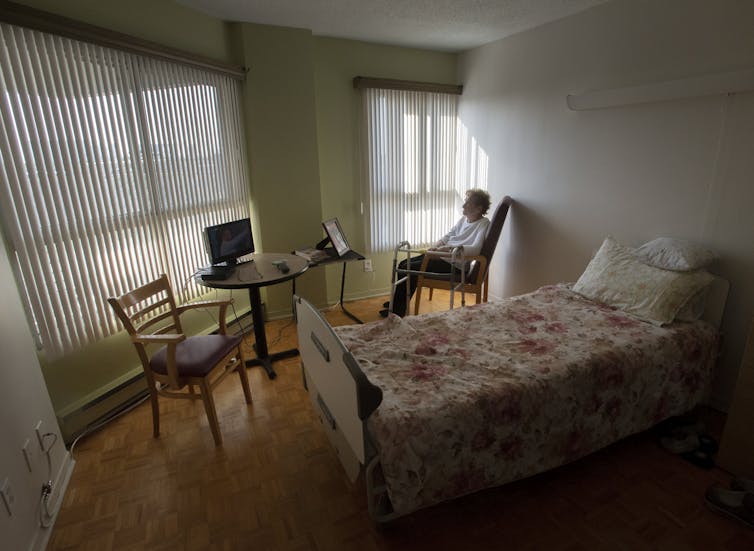Canadians want home care, not long-term care facilities, after COVID-19
A study shows the COVID-19 pandemic has made Canadians fear sub-standard and dangerous living conditions in nursing homes. They want home care, and tax policies that will support it.


The COVID-19 pandemic has shed light on the precarious living conditions of the elderly in nursing homes in Canada.
During the first wave of the pandemic, from March to August 2020, more than 80 per cent of Canadian COVID-19 deaths were tied to nursing and seniors’ homes, according to the Canadian Institute for Health Information.
The pandemic put nursing homes in the spotlight in terms of how they’ve been managed, their lack of staff and COVID-19’s impact on the living conditions of the dependent elderly people who reside within them.

COVID-19 and the media coverage of the crisis in long-term care have raised public awareness about the risks associated with such facilities. It may have also permanently affected perceptions and preferences when it comes to long-term care.
In the fall of 2020, we partnered with Asking Canadians, a Canadian online panel survey organization, to conduct a poll of more than 3,000 people in Ontario and Québec between 50 and 69 years old. The goal was to learn how the pandemic had affected their views on long-term care.
The survey asked questions about long-term care preferences and whether respondents were more supportive of home care because of COVID-19.
Majority want to avoid nursing homes
The survey shows the pandemic has dramatically changed perceptions, preferences and ultimately the financial behaviour of Canadians when it comes to long-term care.
A full 72 per cent of our respondents said they were less inclined to enter a nursing home, and 70 per cent of them said the pandemic caused them serious concerns about exposure to health risks in long-term care facilities.
At the same time, about 25 per cent said they planned to save more for old age because of COVID-19 and their desire to avoid entering nursing homes in favour of home care.
Lastly, we observed strong support for tax policy that would subsidize home care, with 70 per cent of respondents calling for it. This increased support for home-care policies in the post-pandemic era is driven by the desire to avoid entering nursing homes.
At its essence, our study shows the COVID-19 pandemic has made Canadians fear sub-standard living conditions in nursing homes and has made them realize the urgency of finding adequate care alternatives and solutions for our elderly population. We can only hope that policy-makers use this opportunity to address the issue.

The global population is aging
The findings of our survey provide important information for any country with aging populations and increasing health needs. According to a study by the Organization for Economic Co-operation and Development, the number of people aged 80 and above is expected to grow from four per cent of the total OECD population in 2010 to 10 per cent in 2050.
Canada is not exempt from this trend. The number of people in Québec who need help with the activities of daily living is likely to almost double from 315,000 in 2020 to more than 600,000 in 2050.

COVID-19 has caused both policy-makers and the population in general to think about alternative solutions to nursing home care, particularly home care. But home care is expensive, even when governmental subsidies exist — it has a much heftier price tag than public nursing home care.
And for those who don’t have family members who can provide informal care, public long-term care homes are often their only choice.
The pandemic has forced society to question the appeal and expense of home care versus long-term care facilities. Canadians who want to opt for home care will need to start saving for retirement accordingly in case they become dependent and want to avoid nursing homes.
Read more: After COVID-19's tragic toll, Canada must improve quality of life in long-term care homes
Policy-makers must also develop adequate long-term care standards to ensure a deadly disaster like the one that occurred during the COVID-19 pandemic doesn’t happen again. That will require building new, safer nursing homes and adequately staffing them, training long-term care workers in safety and sanitation protocols and paying them a better wage.
But our survey shows Canadians would overwhelmingly prefer home care options as they age. Governments must make home care a viable option for their aging citizens by making it more affordable via a variety of means, including subsidies and tax exemptions.![]()
Leroux Marie-Louise receives funding from FRQSC and SSHRC-CRSH.
Bertrand Achou receives funding from SSHRC-CRSH.
Franca Glenzer receives funding from SSHRC-CRSH.
Minjoon Lee and Philippe De Donder do not work for, consult, own shares in or receive funding from any company or organisation that would benefit from this article, and have disclosed no relevant affiliations beyond their academic appointment.
What's Your Reaction?






























































































